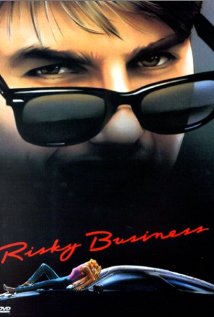 Did former New York Mayor Michael Bloomberg, former Treasury Secretary and Goldman Sachs CEO Hank Paulson, and retired hedge fund-turned climate action advocate Tom Steyer–the three musketeers behind the just-published Risky Business report–ever see the 1983 movie Risky Business? Even if they hadn’t, they surely must have known about its premise before agreeing to use the name for their study on the business risks of climate change.
Did former New York Mayor Michael Bloomberg, former Treasury Secretary and Goldman Sachs CEO Hank Paulson, and retired hedge fund-turned climate action advocate Tom Steyer–the three musketeers behind the just-published Risky Business report–ever see the 1983 movie Risky Business? Even if they hadn’t, they surely must have known about its premise before agreeing to use the name for their study on the business risks of climate change.
Remembered now for Tom Cruise's twenty-one year old breakout performance and for his inebriated dance moves, the movie celebrates youthful exuberance, entrepreneurial zeal, the privileges of wealth, and, yes, prostitution. The moral of the story seems to be that cool shades, boyish good looks and good luck can help you wiggle out of responsibilities before any serious consequences kick in. By the end of the movie, the hero has made a pile of illegally gained money, manages to clean his parents’ house, wins the hooker with the heart of gold, and is accepted into Princeton.
Viewed from a distance of 31 years, the movie is like a time capsule of that era's “greed is good” ethic, also plumbed by such later films as Wall Street, The Wolf of Wall Street, and Margin Call. Cruise’s character asks the question: “Does anyone want to accomplish anything or do we just want to make money?” His friends are unanimous: “Make money; lots of it.” Forget rules, regulations, or ethics. Idealism is for suckers.
Some will make the case that the three titans behind the Risky Business initiative had something in common with that Tom Cruise character in their earlier years. But now they’ve taken the tagline of the movie–”There’s a time for playing it safe and there’s a time for risky business”–and turned it on its head.
Far from glorifying individual ambition, the message of the report is clear: ignoring the risks of climate change is bad business. In his New York Times op-ed–"The Coming Climate Crash"–previewing the report, Paulson compared the potentially catastrophic economic consequences of climate change to the bursting of the credit bubble, only much worse.
Citing the intergenerational aspects of climate change, he writes:
When you run a company, you want to hand it off in better shape than you found it. In the same way, just as we shouldn’t leave our children or grandchildren with mountains of national debt and unsustainable entitlement programs, we shouldn’t leave them with the economic and environmental costs of climate change.
Another thing the Risky Business report turns on its head is our society’s near universal portrayal of climate change as a topic with only two sides: either you “believe” in it, or you don’t. As the report makes clear, business owners ignore abundant evidence at their peril and owe it to their stockholders to assess and prepare for risks that could affect their profits.
They purchase insurance, research consumer preferences, prepare damage control plans to respond to possible scandals, and keep a close eye on their competitors. Not to do so would be irresponsible. Similarly, the Risky Business report admonishes us to drop the fruitless debate over whether or not climate change is happening, and prepare for the most likely outcomes.
The report is authoritative and is meant to help further encourage the business community and the nation as a whole to confront tough decisions. Ultimately, each company will need to wrestle with questions like: If you are a business with coastal property and the risk of sea level rising one foot by 2050 in your area is 95% and the risk of it rising 18 inches is 25%, what kinds of investments should you make to mitigate the risk? How might zoning regulations and building codes or insurance premiums be adjusted? How can we best manage the risk short term and long term?
These discussions are not black and white, nor are they simple. Clear-headed discussions and sustained public engagement will be required throughout the public-private sectors. Individuals and businesses, communities and government agencies, will all have to start thinking in terms of assessing and responding to degrees of risk. This will mean more complex and challenging debates than the childish dichotomy that has characterized discussions of climate change to date, but it is high time for the debate to enter a more mature stage.
Not that this will be easy. The comment section of the NPR article about the report was immediately overrun by those who dismiss climate change science with the typical claims that climate change is a hoax out to destroy America. Fortunately, many businesses already are starting to take action on climate change even if they don't advertise the fact.
In the 1980s, you could get away with a movie that suggested you could break all the rules and suffer no serious consequences. As real estate and dot.com bubbles burst, and Wall Street crashed, the danger of such fantasies became clear. We’ve been warned about the risks of climate change for more than half a century. But many still seem to be living in a Hollywood fantasy of breaking the rules and getting away with it. The Risky Business report says: it’s time to grow up.
